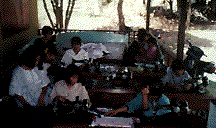Contemporary Issues in the Philippines
The Philippines has a population of 68 million people of which 47% are children ages 0 to 18 yrs old. The issue here is that there are 3.7 million children and 2.2 million of them are in hazardous work like quarrying, mining, diving and commercial sexual exploitation. There are two important laws that the Philippine government implemented to protect their rights. One is the Republic Act 7610 known as the "Special Protection Act for Children," amended by R.A. 7658. The second is the Presidential Decree 603, "The Family and Children Welfare Code." The big question is why we still have a big population of child labour? As a child labor advocate, even I cannot answer this question. However, looking at different angles, I could give a scenario of a child labour issue.
A sweatshop in
the Phillipines

Poverty is one of the major problems in our country. Half of our population is below the poverty line. This means that many poor families are suffering from being poor, parents are unemployed and malnutrition goes with it. Children are very much affected. Many parents use their children to earn a living or to survive. Many parents are forced to do it because there is no choice and there is nothing they can do, though they want their child to stay home instead of earning money in quarrying, mining and other hazardous jobs that would impair the normal development of the child.
The sad thing is some children are in bonded labour, working to pay the debt of their parents and even their ancestor. Bonded labour has passed from generation to generation and what we see today is not new. A child labourer is illiterate, uneducated which results in unemployment which means he or she cannot educate his or her children as he or she experienced when he or she was a child. Life is a cycle, and the child labour issue is like a cycle, but unless we alleviate poverty, we can not stop it.
I'm an advocate of this issue and I'm honest to say that I'm not satisfied of what I have done for children. For me, its a very small contribution that I or every Filipino citizen can do to help their country. Awareness on this issue is a great help to recognizing that there is a big thing that needs attention. I myself came from a poor family. I'm a recipient of a Government scholarship program and I don't believe that because of it, I can't have an education because it's not my right. But why should these children have to fight to have an education so they can overcome the poverty that they experience right now? Why do they have to be engaged in hazardous work to survive and to earn an education? Where is the law which is supposed to protect and ensure their rights? Where is the government to help the people, to help the poor? Do these children who are victims of child labour have hope for a brighter future?
From my own point of view, we need a strong political will from the government to push the law on child labour, just as those companies who are hiring or accepting child workers, should receive punishment.The socio-economic program which is going on is very necessary and will be effective if it is implemented well and if many poor families benefit from it. Of course, livelihood, literacy and family education programs about responsible parenthood would be a lot of help. My mission now as a child advocate is to work towards stirring awareness of the protection of RIGHTS OF THE CHILD but doing this alone is difficult. We need more people who are going to commit themselves to protect and respect the rights of our innocent children.

TG Magazine / The Students Commission
© 1997 le magazine TG / la Commission des étudiants